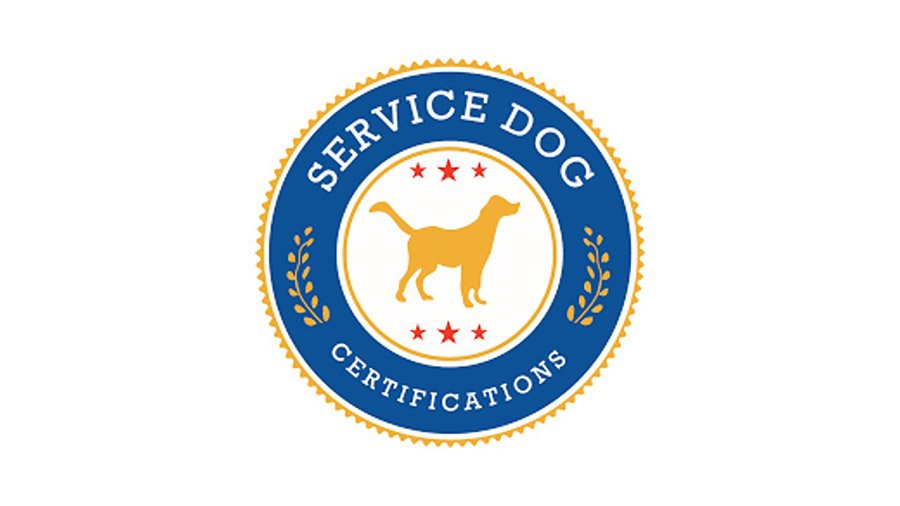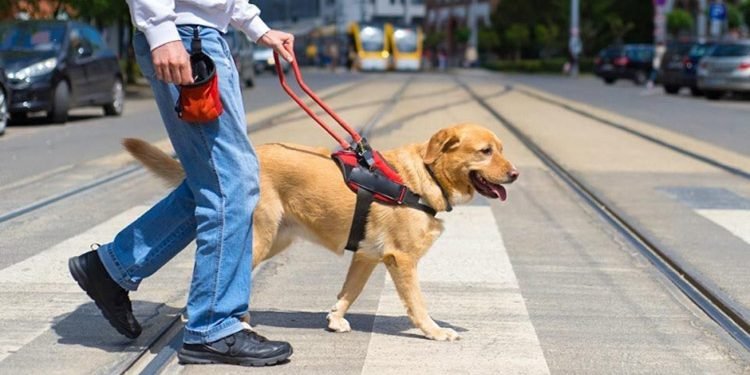Many dog owners would agree that their dogs are their most fabulous friends. Still, people with particular physical, neurological, or mental health issues also find that various service dogs are vital allies in daily life. Most of these service dog breeds are permitted in locations where pet dogs are not. Unfortunately, the rights of legitimate assistance dog handlers, particularly those with invisible impairments, have been compromised by the habit of non-disabled persons misrepresenting companion dogs as various service dogs.
Titles II and III of the ADA Define Service Animal
Service dogs are specially taught to work or complete duties for the benefit of a person with a handicap situation, such as a physical, sensory, psychiatric, intellectual, or other mental impairment. A service animal helps these people by supporting them. Pulling a wheelchair, picking up fallen objects, alerting someone to a sound, reminding someone to take their prescription, or pushing the elevator button are just a few examples of tasks that service dogs can do.
Comfort animalsand emotional support animals are not considered service animals under Title II and Title III of the ADA. Other animal species, whether wild or domestic, skilled or unskilled, are also not regarded as service animals. A service animal can only perform actions directly connected to the person’s impairment. Whether a person receives a statement from a doctor stating that they have a handicap and require the animal for emotional support is irrelevant. A pet does not become a service animal just because a doctor signs off on it.
Registration

Owners of service dogs and emotional support animals can build a free online public profile for their animals through the USA Service Dog Registration, a free registration service. The creation of a profile with an official USA Service Dog ID will assist eligible people in gaining access to public spaces under the federal Americans with Disabilities Act (ADA) for titles II (state and local government services) and III (public accommodations and commercial facilities), as well as housing under the Fair Housing Act.
emotional support animal registration service
You may quickly look for the handler and Dog for verification reasons by emotional support animal registration service for free at USA Service Dog Registration. You can also check out emotional support animal registration service if you are thinking of getting an ESA. To make it easy to access when required, your profile can include pictures of you, your service animal, and any necessary medical documents or training certificates. Your registration will be confirmed through email and a Registration ID that may, if necessary, be checked on website.
Additional Therapy or Support Animals
Even though therapy animals, such as emotional support or comfort animals, are frequently utilized in medical treatment plans, they are not protected by the ADA as service animals. These support animals do not have specialized training to carry out duties that aid people with disabilities. Still, they give the company, alleviate loneliness, and occasionally help with sadness, anxiety, and specific phobias. Although certain states have defined therapy animals in their legislation, these animals are not just used to assist persons with disabilities and are not protected by federal regulations that govern the use of service animals. People who need to enhance their physical, social, emotional, or cognitive functioning can get therapeutic contact from therapy animals, generally in a clinical environment.
The duties of the handler
The care and control of the handler’s service animal is their responsibility. A company or other body is not required to permit a service animal into its premises if the animal misbehaves and the person with the disability cannot manage it. Unacceptable conduct for a service animal includes rushing away from the handler, leaping on other persons, and uncontrolled barking` . A company can forbid a dog from entering if it interferes with operations. For instance, an assistance dog that continuously barks and interferes with another viewer’s enjoyment of a film can be asked to leave the cinema.
When a service animal’s actions directly endanger the health or safety of people, businesses, public programs, and transportation the providers may refuse to accommodate the animal. The handler of a service animal can be requested to take it out of the business if it starts snarling at other customers.

Rights of the dog owner:
Public Services and Facilities
According to ADA Titles II and III, service animals are welcome in public spaces and lodgings. In any area of the building or facility open to the general public, program participants, customers, or clients, a service animal must be permitted to travel with its handler. Even if a company or public event has a “no pets” policy, a service animal owner may still be allowed access. Pets are not servicing animals. Therefore, although a “no pets” policy is lawful, it does not permit a business to bar service animals.
Employment laws forbid discrimination in the workplace on the grounds of a handicap.
Employers must provide a justifiable accommodation. It may be considered an accommodation to let a person with a handicap bring a service animal or emotional support animal to work. There are no explicit rules regarding service animals enforced by the Equal Employment Opportunity Commission (EEOC), which oversees the ADA’s (Title I) employment requirements. 7 In the case of a service animal or emotional support animal, an employer may ask for paperwork to show that a handicap exists and how the animal helps the person perform their job if the impairment is not immediately apparent or the need for the animal is not immediately apparent.
A thorough explanation of how the animal will assist the employee in carrying out job duties and how the animal is educated to behave in a work environment might be included in the documentation. A person requesting such a modification may propose that the employer grant the employee’s request for a trial period of animal companionship.
Housing
A person with a handicap is shielded from discrimination when looking for a home by the Fair Housing Act (FHA). This legislation requires landlords and homeowner’s associations to provide reasonable accommodations for individuals with disabilities so that they may use and enjoy a house equally. 8 Even though they are not considered service animals by the ADA, emotional support animals may be considered reasonable accommodations under the FHA. 9 Waiving a no-pet policy or a pet deposit is an example of reasonable accommodation for people with disabilities who use service or emotional support animals.
In schools
According to the ADA, a student with a handicap who utilizes a service animal is allowed to bring the animal to class. Furthermore, if a student’s IEP or Section 504 team determines that the animal is required for the student to receive free and appropriate education, the Individuals with Disabilities Education Act (IDEA) or Section 504 of the Rehabilitation Act permits the student to use an animal that does not comply with the ADA definition of a service animal. The use of a service animal is a legal entitlement under the ADA that is not subject to an IEP or Section 504 committee approval. Thus, schools should be aware of this when it applies.
Transportation Even if there is a “no dogs” policy.
If a person traveling with a service animal cannot be denied access to transportation. Additionally, the customer flying with a service animal is not need to notify the airline in advance and cannot be made to sit in a specific location or pay an additional cost because the individual employs a service animal.
Both public and commercial transportation companies must abide by the legislation, which covers services including fixed-route buses, Paratransit, rail, light-rail, taxis, shuttles, and limousines, as well as subways and fixed-route buses.
Conclusion
Service animals are allowed in public places by order of the law. However, the owner must take full responsibility for the dog’s good behavior. It is necessary to know the complete process and rules that apply to the service dog owner and also know about your rights. If you are dealing with a disability or a severe situation, you can travel with your dog and take your service animal to public places.












